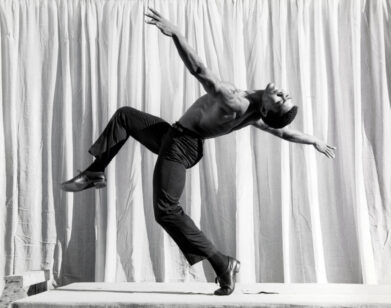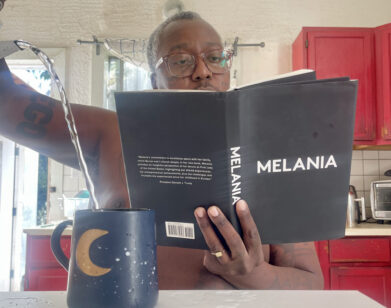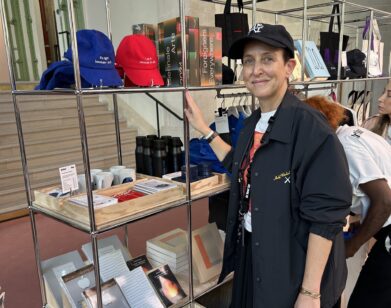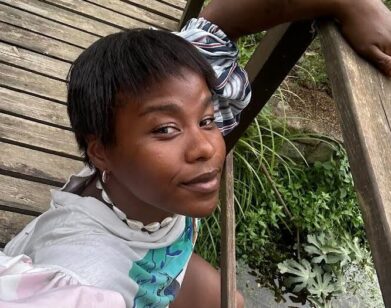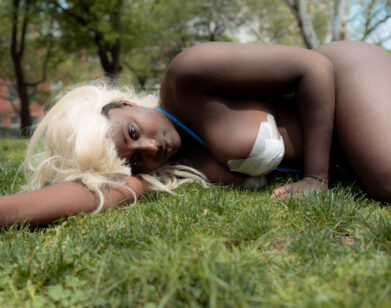rough draft
Melissa Broder Likes to Write at Funerals
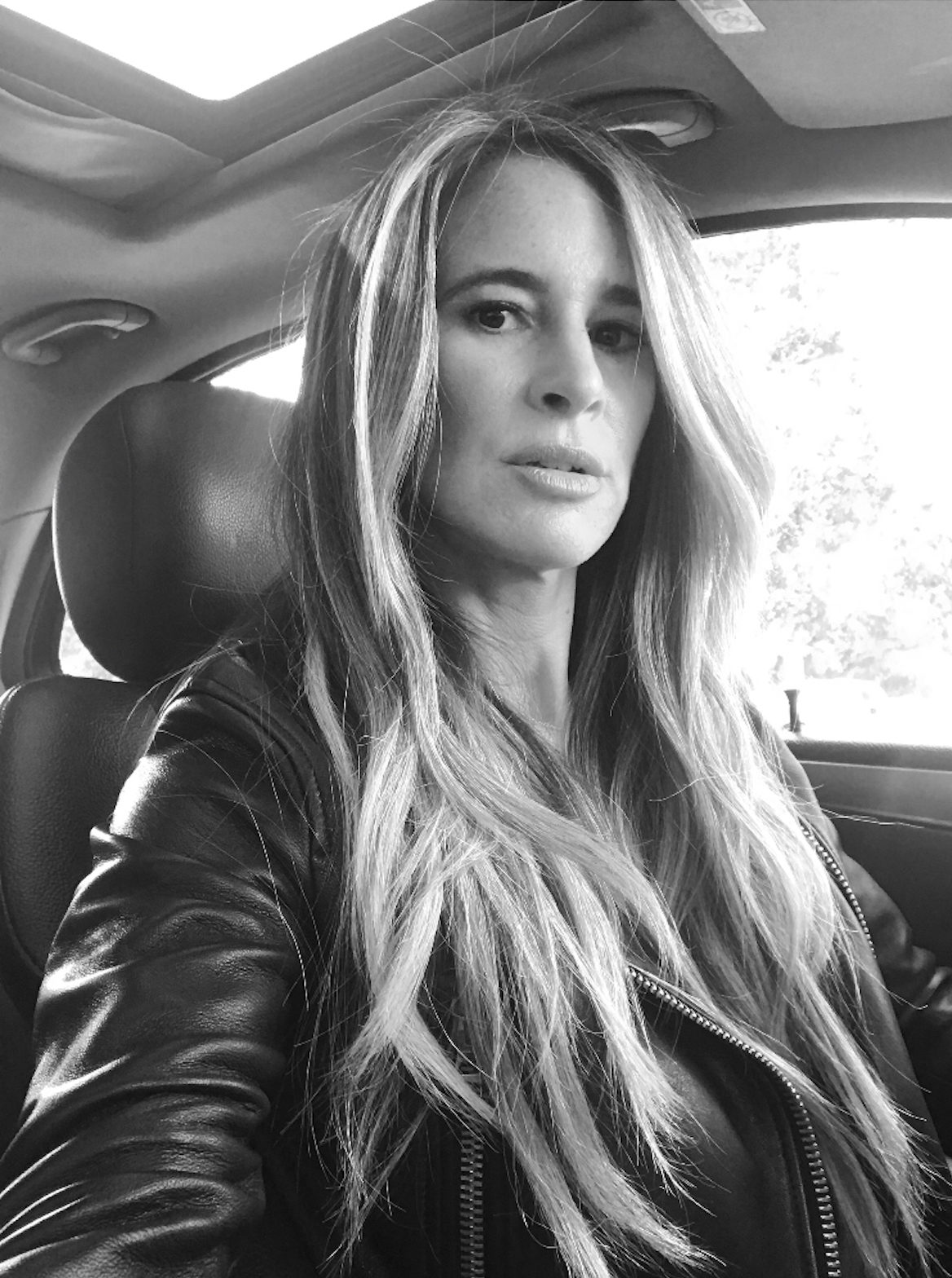
This is Rough Draft, in which our favorite writers get to the bottom of their own craft. From preferred writing drinks to whether or not you really need to carry a notebook, we find out all the ways they beat writer’s block and do the work. This week, we speak with Melissa Broder to mark the paperback release of her novel Milk Fed. The book follows Rachel, a young Jewish woman who navigates the depths of desire, hunger (both physical and emotional), and yearning while embarking on a ninety-day communication detox. Broder will also release a new poetry anthology, called Superdoom, on August 10th. Here, discover all the elements that helped her get there.
———
JULIANA UKIOMOGBE: Describe your ideal writing atmosphere. What gets you in the mood?
MELISSA BRODER: Definitely not a desk. I prefer to write in places where I’m not supposed to be writing (like the bathroom at a funeral) because then there’s less pressure. Less emphasis on perfection. When I lived in New York, I wrote poems on the subway. When I moved to Los Angeles in 2013, it was no longer safe to write in transit (it’s ill-advised to type poems while driving on the 405). So I began to dictate my work using Siri and the notes app. The line breaks disappeared and the language became more conversational. That’s how I started writing prose. As for edits, I email drafts to myself every few paragraphs and look at them as PDFs, because it gives me some distance from what’s on the page. A new eye. I also read back to myself out loud. I treat prose like lyric poetry. I punctuate for rhythm. This all happens in bed. As for mood, I don’t wait for it. I’m motivated by the fear of not creating. Also, the wisdom of no escape. The writing is happening today whether I’m in the mood or not. It’s happening in small chunks—40 minutes, three paragraphs, whatever doable quantities I’ve assigned myself for the days that week (and it’s always doable quantities until the last months of edits when I live in it full-time). But it’s happening.
UKIOMOGBE: Do you eat or drink while you write? If so, what do you like to have?
BRODER: Coke Zero.
UKIOMOGBE: Do you ever smoke or drink alcohol while you write? How do you think they impact your writing?
BRODER: I chain-chew nicotine gum. I haven’t written without nicotine since I was 16 (the cigarettes are long gone, but gum springs eternal). I’m unclear as to the exact impact of the gum on my writing because I’m never without it. But I think it’s about focus. Also, little doggy treats for keeping focused.
UKIOMOGBE: Do you keep a notebook and/or journal?
BRODER: The internet destroyed my journaling. From private to public: a tale of reward-based conditioning and dopamine receptors.
UKIOMOGBE: Do you prefer handwriting or typing?
BRODER: I do it all, baby. Dictation for prose drafts. Typing for edits. Handwriting for inspired moments mid-meditation.
UKIOMOGBE: What’s your favorite quote?
BRODER: “When half-gods go, / The gods arrive.” — Ralph Waldo Emerson
UKIOMOGBE: Whose writing do you always return to?
BRODER: Lately, Marguerite Duras.
UKIOMOGBE: What’s your favorite book to reread?
BRODER: Goodbye, Columbus: And Five Short Stories by Philip Roth.
UKIOMOGBE: What books did you read as a kid/teen?
BRODER: My Dad died in May. I used to steal all of his books as a teen. Back then, I was just thinking: escape. Now, I’m rereading his library and thinking: Dad was here.
UKIOMOGBE: Which writers inform your current work the most?
BRODER: How about I tell you some books I’ve read in the last year that I loved. I bet those are informing my work. Also, who doesn’t love a list?
Problems by Jade Sharma, Woodcutters by Thomas Bernhard, The Ice Palace by Tarjei Vesaas, Summer Rain by Marguerite Duras, Fish Soup by Margarita Garcia Robayo, The Pure and the Impure by Colette, Inferno by Eileen Myles, Cheri by Colette, 10:30 on a Summer Night by Marguerite Duras, 100 Boyfriends by Brontez Purnell, The Life of the Mind by Christine Smallwood, The Grapes of Wrath by John Steinbeck, Leave Society by Tao Lin, To the Friend Who Did Not Save My Life by Hervé Guibert, Hoarders by Kate Durbin, Correction by Thomas Bernhard, The Death of Ivan Ilyich by Leo Tolstoy, Desert Solitaire by Edward Abbey, Confessions of a Mask by Yukio Mishima.
UKIOMOGBE: How many drafts of one piece do you typically write?
BRODER: Millions.
UKIOMOGBE: What would the title of your memoir be?
BRODER: Am I Tired or Dying?
UKIOMOGBE: Who’s your favorite screenwriter?
BRODER: My favorite movies are The Big Lebowski, Groundhog Day, and Harold and Maude.
UKIOMOGBE: Do you consider writing to be a spiritual practice?
BRODER: Of course. There’s alchemy involved. Repetition. Faith. And you have to leave room for the mystery.
UKIOMOGBE: Which writers would you choose to have dinner with, living or dead?
BRODER: Isaac Bashevis Singer for dinner. Sexting with Emily Dickinson and Lord Byron. But not dinner.
UKIOMOGBE: What advice do you have for people who want to be better writers?
BRODER: Write from the pussy. Just kidding. Depends on the person, their strengths, and weaknesses. As a universal: read and write.
UKIOMOGBE: What are some unconventional techniques you stand by?
BRODER: Low self-esteem.
UKIOMOGBE: Can great writing save the world?
BRODER: I think we would first need to define save.


